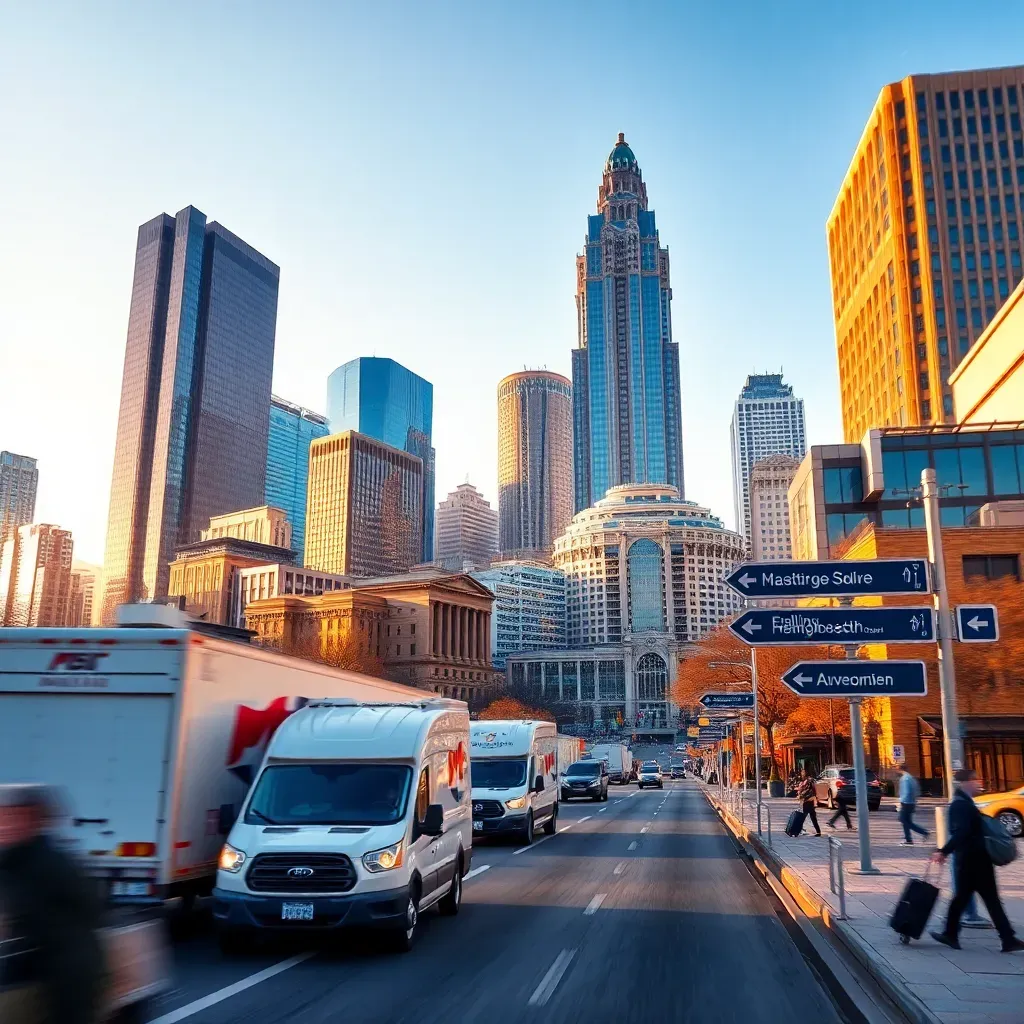Is Atlanta moving to a dangerous city? What you’re not being told
- Getting Real About Atlanta’s Reputation
- The Question: What Does “Is Atlanta Moving To” Really Mean?
- Atlanta’s Crime Landscape: The Numbers and What They Actually Say
- Is Atlanta Becoming a Dangerous City? Myths vs Reality
- Neighborhoods and Communities: Where Is It Safe, and Where Should You Watch Out?
- People, Police, and Public Safety: Who’s Keeping Atlanta Safe?
- How Atlanta Compares: Is It Really More Dangerous Than Other Big Cities?
- Why Are People Still Moving to Atlanta? The Bigger Picture Beyond Crime
- What To Know Before Moving: Safety Tips and How to Navigate Atlanta’s Risky Spots
- Opinions From the Streets: What Real People Are Saying About Atlanta’s Safety
- What You Need to Know About Atlanta’s Safety and Moving There
- Sources and References
Getting Real About Atlanta’s Reputation
Atlanta’s vibe is a mix of southern charm, booming business, and a fast-growing population. It’s a city that’s been on the rise for years, attracting folks from all over the US looking for jobs, culture, and a more affordable lifestyle. But with growth comes questions — especially about safety. When people ask, “is Atlanta moving to a dangerous city?” they’re really trying to figure out if the city’s rapid changes are bringing more risks or if it’s still a place where communities thrive.
People want honest talk about crime, not just headlines screaming danger. They want to know if it’s safe to walk the streets, raise a family, or invest in a home here. Are people moving away because of crime, or is Atlanta still a magnet for newcomers? This article aims to answer those questions by looking at the numbers, neighborhoods, police efforts, and real stories from residents. We’ll cut through the noise and give you a balanced view of what’s really going on.
The Question: What Does “Is Atlanta Moving To” Really Mean?
The phrase “is Atlanta moving to” can be a bit confusing. In this context, it’s about whether the city itself is shifting toward being more dangerous or safer. People often wonder if Atlanta is becoming one of those risky towns in US that make headlines for crime or if it’s improving. It also touches on whether people are moving into safer neighborhoods or if the city’s growth is pushing folks into sketchy or dodgy areas.
This question matters a lot for anyone thinking about relocating here, locals deciding where to live, or even just curious onlookers trying to understand urban crime trends. Atlanta is part of a bigger picture of dangerous cities in US, and understanding where it stands helps people make informed decisions about safety and community.

Atlanta’s Crime Landscape: The Numbers and What They Actually Say
When you look at crime stats, Atlanta often pops up alongside cities like Chicago, Detroit, Baltimore, St. Louis, Memphis, Cleveland, New Orleans, and Philadelphia. These cities share some challenges, but it’s important to dig into the details.
Violent crime in Atlanta includes things like assaults and robberies, while property crime covers burglaries and thefts. Over the last decade, some violent crime rates have fluctuated — rising in certain years and falling in others. Property crime tends to be more stable but still a concern in some neighborhoods.
Certain areas in Atlanta are known for being more rough or shady. These include neighborhoods with higher poverty rates or less police presence at night. Residents often warn about streets with poor lighting or spots where incidents have happened. Police reports show that response times can vary, especially in busy or high-risk zones.
Socioeconomic factors play a big role. Neighborhoods struggling with poverty often see more crime, which affects both residents and visitors. Understanding these dynamics helps explain why some parts of Atlanta feel risky while others are much calmer.
Is Atlanta Becoming a Dangerous City? Myths vs Reality
There are plenty of myths floating around about Atlanta’s safety. Some say the city is spiraling out of control, while others claim it’s safer than ever. The media sometimes focuses on the worst incidents, which can paint an exaggerated picture.
Locals and experts often have a different take. Many say Atlanta is not necessarily becoming more dangerous overall but is changing. Growth brings new challenges, like increased traffic and some crime shifting to different neighborhoods. But community policing and local efforts are making a difference.
Compared to other unsafe cities in US, Atlanta’s crime risks are serious but not unique. It’s not a city where danger lurks around every corner, but it’s also not free from issues. The city’s urban changes — new developments, population shifts — affect safety in complex ways.
Neighborhoods and Communities: Where Is It Safe, and Where Should You Watch Out?
Atlanta’s neighborhoods are a patchwork of different vibes and safety levels. Places like Buckhead and Midtown are often seen as safer and more family-friendly, with active community groups and better police presence. Decatur, just outside the city, also gets good marks for safety and quality of life.
On the flip side, some areas are considered more dicey, gnarly, or messed-up. These neighborhoods might have higher crime rates or less street lighting, making residents and visitors more cautious, especially at night.
What makes a neighborhood safe often comes down to community involvement and police cooperation. Local groups organize neighborhood watches and work with law enforcement to keep things under control. When moving or visiting, it’s smart to research and listen to locals’ advice about which streets or blocks to avoid after dark.
Real stories from residents show that safety can vary block by block. Some folks love their neighborhoods despite challenges, while others have had run-ins with crime that shaped their view of the city.
People, Police, and Public Safety: Who’s Keeping Atlanta Safe?
The Atlanta Police Department plays a big role in managing crime and keeping the city safe. They run community policing programs aimed at building trust and cooperation with residents. These efforts focus on crime prevention and quick response to incidents.
However, police face challenges, especially in areas with gang-related violence or drug trafficking hotspots. These zones require extra attention and resources. Residents and local businesses also pitch in by reporting suspicious activity and supporting neighborhood watches.
Public safety concerns include occasional violent events and property crimes, but many of these are isolated incidents rather than widespread problems. Police reports and incident data help identify risky zones so resources can be targeted effectively.
How Atlanta Compares: Is It Really More Dangerous Than Other Big Cities?
| City | Violent Crime Rate (per 100k) | Property Crime Rate (per 100k) | Police Response | Community Safety Efforts |
|---|---|---|---|---|
| Atlanta | ~1,100 | ~4,200 | Moderate | Active community policing |
| Chicago | ~1,200 | ~3,800 | Challenged by size | Various local initiatives |
| Detroit | ~1,700 | ~5,000 | Strained resources | Community groups active |
| Baltimore | ~1,500 | ~4,500 | Ongoing reforms | Neighborhood watches |
| St. Louis | ~1,800 | ~4,700 | High crime zones | Focused policing |
| Memphis | ~1,600 | ~4,300 | Resource challenges | Community outreach |
| Cleveland | ~1,400 | ~4,100 | Improving response | Local safety programs |
| New Orleans | ~1,300 | ~4,600 | Variable response | Community policing |
| Philadelphia | ~1,200 | ~4,000 | Ongoing efforts | Neighborhood initiatives |
Atlanta’s crime rates are serious but often lower than some of these other cities. The city’s unique mix of growth, community efforts, and policing shapes its safety landscape. While crime impacts daily life, many neighborhoods maintain strong community trust and active safety programs.
Why Are People Still Moving to Atlanta? The Bigger Picture Beyond Crime
Despite concerns, Atlanta keeps drawing people in. The city’s economy is booming, with jobs in tech, healthcare, and the film industry. Housing is more affordable than in places like New York or Los Angeles, making it attractive for families and young professionals.
Lifestyle perks include a rich cultural scene, great food, warm weather, and plenty of entertainment options. Many movers say they balance safety concerns with these benefits, choosing neighborhoods carefully and staying informed.
Stories from newcomers often mention the welcoming vibe and opportunities that outweigh the risks. Atlanta’s growth story is about more than crime — it’s about building a city with diverse communities and chances to thrive.
If you’re thinking about moving to Atlanta, here are some tips to stay safe and enjoy the city:
- Research neighborhoods thoroughly — check crime maps and local forums.
- Avoid shady or wild areas after dark, especially streets with poor lighting.
- Use public transit like MARTA during daytime; be cautious at night.
- Get involved in community safety programs or neighborhood watches.
- Stay aware of your surroundings and trust local advice.
- Keep emergency numbers handy and know your nearest police precinct.
Community resources and local groups can be a big help for new residents. Staying connected and informed is key to navigating any risky zones safely.
Opinions From the Streets: What Real People Are Saying About Atlanta’s Safety
“I’ve lived in Midtown for 5 years, and while there’s been some petty crime, I feel safe walking around most days. The community is tight, and police are visible.” – Reddit user, r/Georgia
“Certain parts of the city can get dicey at night. I avoid those areas and stick to Buckhead or Decatur, which feel much safer.” – Local resident interview
“Atlanta’s growth means more opportunities but also some growing pains with crime. The police are working hard, but community involvement is crucial.” – Community leader
“I moved here for the jobs and culture. Sure, there are some rough spots, but overall, it’s a city with heart and potential.” – Recent mover
What You Need to Know About Atlanta’s Safety and Moving There
Atlanta is a city of contrasts — growing fast with plenty of opportunities but also facing challenges with crime in certain areas. The truth is, it’s not simply a dangerous city, but it has risky zones that require awareness and caution. Neighborhoods vary widely in safety, and community policing efforts are making a difference.
If you’re thinking about moving, weigh the risks against the benefits. Atlanta offers a unique lifestyle, affordable housing, and a vibrant culture. Staying informed, choosing your neighborhood wisely, and getting involved locally can help you enjoy the city safely.
Remember, no city is perfect, but with the right approach, Atlanta can be a great place to live and grow.
Sources and References
- Reddit r/Georgia discussion on moving to Atlanta
- Atlanta Moving Solutions: Living in Atlanta 2025
- Mayflower Moving Tips: Moving to Atlanta
- InterNations Guide: Moving to Atlanta
- LetsGetMovingUSA: Pros and Cons of Moving to Atlanta
- Apartment List: Moving to Atlanta
- TripAdvisor Forum: Thinking about moving to Atlanta
- Wirks Moving Blog: Living in Atlanta
- Suddath Moving Guide: Moving to Atlanta
- TripAdvisor Forum: Moving to Atlanta Good Neighborhoods
What do you think about Atlanta’s safety? Have you experienced any sketchy or risky spots in the city? How would you like to see the community and police work together to improve safety? Drop your thoughts, questions, or stories in the comments below — your input helps everyone get a clearer picture!
 Is Atlanta living really worth it? The shocking truth you need to know
Is Atlanta living really worth it? The shocking truth you need to know Is Atlanta worst places to live? Shocking crime truths revealed
Is Atlanta worst places to live? Shocking crime truths revealedSi quieres conocer otros artículos parecidos a Is Atlanta moving to a dangerous city? What you’re not being told puedes visitar la categoría Atlanta.

Leave a Reply